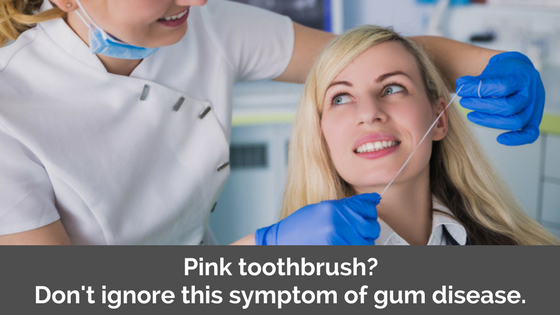
If your toothbrush turns pink when you clean your teeth, you need to pay attention. Bleeding gums are never normal, and the rosy tinge may be a symptom of periodontal disease, a gum inflammation that can damage the tissue and bones that support your teeth. In worst cases, tooth loss and even serious health problems can result.
According to the Centers for Disease Control and Prevention, nearly half of Americans over age 30 have some form of periodontitis, and that prevalence increases to more than two-thirds after age 65. The condition is so common that many people assume – wrongly – that it’s inevitable.
In fact, periodontal disease can be both prevented and treated – and prevention depends a great deal on you. It helps to understand how the condition occurs.
What causes gum disease?
The short answer: bacteria. Everyone’s mouth contains bacteria in the form of dental plaque, layers of bacteria (a biofilm) which have attached themselves to the surfaces of the teeth, partial dentures, crowns, etc. The longer the bacteria and plaque remain on the teeth, the more damage they do. Their waste products are toxic to the gum tissue and, eventually, to the bone.
The key to prevention, then, is this: disturb, dislodge and meticulously remove the bacterial plaque daily. Thorough brushing and flossing is required. If you slacken your dental routine, you risk gum disease.
If the plaque is left undisturbed, within several weeks, early signs of gingivitis, a gum disease, will start. Gingivitis can usually be reversed.
What is gingivitis?
Gingivitis is the beginning of periodontal disease. Your gums will be slightly red, and may be tender and/or slightly swollen. They may bleed when you brush or when your dentist probes. As the gingivitis progresses, these symptoms may become more pronounced. If the problem continues, bone that supports the teeth can be affected and eventually destroyed/lost. This condition is called periodontitis.
What is periodontitis?
With periodontitis, the bone that supports the teeth is damaged and can be destroyed. You may notice that the gum tissue around your teeth is receding or your dentist or hygienist may notice periodontal pockets forming around your teeth. If the condition becomes advanced, your teeth may loosen or shift and need to be removed.
How is periodontitis treated?
Besides your own routine of meticulously cleaning your teeth every day, there are effective treatments available that involve your dentist or hygienist making it possible for you to keep the area clean around your teeth. The typical non-surgical treatment can include root planing and scaling. This involves the removal and elimination of the agents which cause inflammation: dental plaque, its products and calculus.
What are some other risk factors for periodontal disease?
- Smoking: If you smoke, your risk of gum disease is twice that of a non-smoker, according to the CDC. Smoking weakens your immune system and also makes healing after treatment more difficult. Besides properly cleaning your teeth, not smoking is the best thing you can do for your oral health. Even cutting down is beneficial.
- Diabetes: A diabetic’s general risk for infection includes the gums.
- Hormonal imbalance: Hormone changes in women can make gums more sensitive.
- Medications: Certain medications can increase vulnerability to gum disease, especially medicines that cause dry mouth.
- Genes: Some people are inherently more susceptible to gum disease than others. If periodontitis is common in your family, you need to be extra vigilant in keeping your teeth clean.
- Occlusal trauma: This broad category includes damage from bruxism (tooth grinding), bad bites and injuries. These can further complicate the treatment of gum disease.
How does periodontal disease affect overall health?
This may surprise you, but scientists have found periodontal disease may raise the risks of both heart disease and dementia. Bacteria from the mouth can affect other areas of the body. The precise mechanisms for these interactions are not well understood at this point. However, it should be noted that the body is a total system. There is a connection between your dental health and the overall health of your body.
If you experience any signs of gum disease, contact our office.
Meanwhile, continue to diligently brush and floss every day. Your best defense against gum disease is you.



